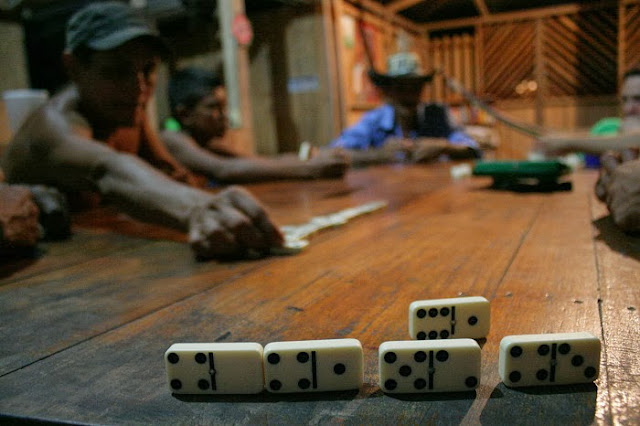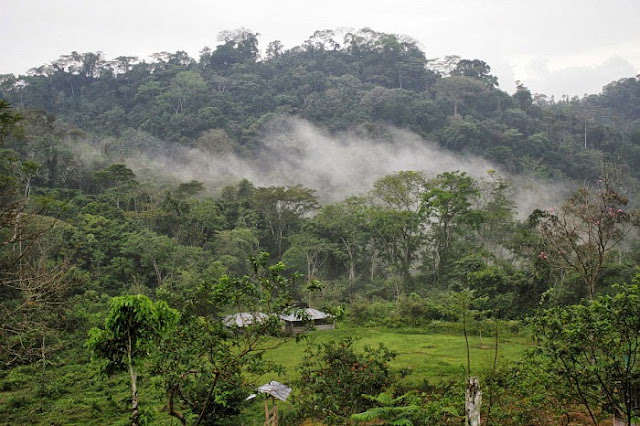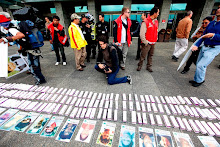Crónica publicada por el semanario Brecha http://brecha.com.uy/musica-
Texto y fotos: Agustín Fernández Gabard
En la cárcel de Las Rosas se formó Lo Ke Salga, una banda integrada por reclusos que ha salido a tocar en varias oportunidades. Brecha estuvo con ellos en el hogar Desafío, donde brindaron su espectáculo para los adolescentes allí internados.
Batería eléctrica, tumbadoras, guitarra, bajo, micrófonos y accesorios varios se van apilando, son las 9 de la mañana y Lo Ke Salga se apronta para salir a tocar. En este caso “salir” tiene un sentido especial, ya que la banda está formada por personas privadas de libertad que cumplen condena en la cárcel de LasRosas, en Maldonado.
En julio de 2015 Silvia Franco, operadora penitenciaria desde 2012, junto con Marcelo, que cumple condena en la institución, decidieron formar una banda a modo de proyecto cultural de apoyo a la rehabilitación, una alternativa más dentro de los distintos talleres quese imparten en la cárcel. “La última vez que salimos a tocar fue a Montevideo, a un seminario de la Oit sobre educación en contexto de encierro. Vino un bondi grande de la Policía a buscarnos. A la ida, en un semáforo por Villa García, unos pibes vieron el bondi y hacían como que nos disparaban con las manos, ¡justo a nosotros nos vienen a confundir con milicos! A la vuelta agarró un rato por la rambla; te imaginás, ¡íbamos de ñata contra el vidrio!”, cuenta Alexander, bajista de la banda, mientras acomoda unos parlantes.
En julio de 2015 Silvia Franco, operadora penitenciaria desde 2012, junto con Marcelo, que cumple condena en la institución, decidieron formar una banda a modo de proyecto cultural de apoyo a la rehabilitación, una alternativa más dentro de los distintos talleres quese imparten en la cárcel. “La última vez que salimos a tocar fue a Montevideo, a un seminario de la Oit sobre educación en contexto de encierro. Vino un bondi grande de la Policía a buscarnos. A la ida, en un semáforo por Villa García, unos pibes vieron el bondi y hacían como que nos disparaban con las manos, ¡justo a nosotros nos vienen a confundir con milicos! A la vuelta agarró un rato por la rambla; te imaginás, ¡íbamos de ñata contra el vidrio!”, cuenta Alexander, bajista de la banda, mientras acomoda unos parlantes.
El destino en esta oportunidad es el Centro Desafío, del Inisa (ex Sirpa ), en Montevideo. Están invitados a tocar en la actividad de fin de año con los internos, sus familiares y funcionarios. Los gustos musicales de los integrantes se dividen principalmente entre el rock y la música tropical. Luis, el profesor y guitarrista de la banda, es roquero, un músico virtuoso que se luce en cada oportunidad que tiene de meter un solo. Marcelo, el baterista, es quizás el que más lo sigue en gustos musicales, pero tiene claro que ellos hacen de todo, “por eso el nombre de la banda, porque hacemos rock argentino, cumbia, plena, lo que nos pida la gente, hacemos lo que salga”.
El ómnibus está demorado. Mientras algunos tocan la guitarra, Fabián, el sonidista, junta cables, un soldador y estaño, “por las dudas”; Leonardo, el percusionista, se mueve preocupado de un lado a otro: no ha llegado la autorización de la jueza para que pueda salir a tocar. “La última vez que la vi me dijo que no iba a tener problema para este toque, tengo buena conducta, estoy en varios talleres, no tengo ninguna falta...”, cuenta mientras busca hablar con el director de la cárcel. “Sin Leonardo, que toca las pailas, va a ser imposible hacer plena, que es lo que a los pibes les gusta más. ¡Nos van a tirar con todo si no hacemos unas plenas!”, dice Líber, vocalista de la banda, a quien de a ratos le dicen “Catálogo” por la cantidad de tatuajes en su cuerpo.
Inmediatamente después de que el director les confirma que, a pesar de sus gestiones, Leonardo no va a poder salir, llega “el bondi”, que de ómnibus tiene poco. Es una camioneta policial grande y sin ventanas atrás, de las que se usan para transportar presos. La sorpresa es grande, la desilusión también: “No puede ser, esto no tiene ventanas, nos vamos a morir de calor hasta Montevideo en esto”. Silvia también está sorprendida por el transporte, pero ya no queda margen para discutir, así que entre críticas empiezan a cargar. “¡Mirá, acá es donde va Hannibal Lecter atado!”, dice Alexander al ver la jaula chica que aparece al abrir la puerta de la camioneta.
La “jaula de Hannibal” queda repleta de equipos. Silvia va sentada adelante, junto al chofer, y la banda atrás, en la jaula grande. “Por lo menos no vamos atados”, comenta Maxi, el tecladista. Marcelo critica, porque “mucha conducta ejemplar, nos llevan a tocar para la Republicana y eso, pero al final parece que nos habíamos olvidado de que somos pichis”. Ya en la carretera sigue sin llegar viento al fondo de la camioneta, Alexander y Líber se ponen a cantar una de Calamaro: “Hace calor/ hace calor...”.
“A mí la música me ha acompañado toda la vida; hasta en los peores momentos, como éste, ella me sacó adelante. Me pasa que en ese segundo en que estamos tocando no estamos enla situación que estamos, estamos haciendo música, estamos divirtiéndonos y la música es eso, es diversión, unión. La música nos libera, nos saca de acá mentalmente”, cuenta Alexander en una pausa del improvisado concierto.
Al fin la camioneta llega al Cerrito de la Victoria y estaciona dentro del hogar Desafío. Después de descargar en el comedor y almorzar las pizzas hechas en la cocina de Las Rosas, el director del hogar los guía por los talleres educativos y de oficios que tienen allí. “Los vi cuando tocaron en la Intendencia y me encantaron, enseguida quise traerlos a tocar acá”, les cuenta al terminar el recorrido.
El patio del hogar tiene capacidad para unas 100 personas. Las paredes son de ladrillo, algunas están pintadas de colores vivos, hay rejas en todas las ventanas y en el techo, tapadas para la ocasión con una malla de media sombra negra. Mientras la banda apronta todo y Fabián enchufa los cables, van llegando varios familiares de los jóvenes y algunos funcionarios. Lo Ke Salga será la banda encargada de abrir la jornada, que incluye la presentación de lo hecho en el año en los talleres del hogar y un gran cierre a cargo de Gerardo Nieto y su orquesta. Cuando terminan de armar todo vuelven al comedor, donde dejaron las mochilas, para ponerse las remeras oficiales de la banda y darse ánimos antes de salir a la cancha.
Llega el momento de tocar y empiezan con algunos clásicos del rock argentino: “Quiero verla en el show/, es como un gato siamés...”. Bailan más las educadoras del hogar que los jóvenes. Pero ante la insistencia de éstas –y la posibilidad de hacer pogo– se van arrimando a la pista armada en el espacio entre los músicos y las sillas. Ya cuando suena la primer plena, un tanto improvisada al estar sin timbales ni tumbadoras, se cumple el pronóstico de Líber, la pista se llena de jóvenes que bailan de la mano con las educadoras, en pareja entre ellos o en rondas. Risas, vueltitas y hasta un trencito se apoderan del patio.
Entre aplausos y pedidos de una más se termina la presentación de Lo Ke Salga. Uno de los jóvenes del centro se acerca a darles un regalo, es una imagen del Quijote encuadrada en mimbre por ellos mismos; en la parte inferior dice “Pa Lo Ke Salga. Gracias por creer en nosotros”. Fabián empieza a desenchufar todo y a desarmar, Marcelo aprovecha para fumarse un pucho, uno de los jóvenes que más bailaba se acerca a saludar a Maxi. “Es el hijo de mi compañero de celda en Las Rosas”,cuenta después.
Alexander está sentado contra una pared, fumando con Marcelo. “Tocar acá fue muy lindo, porque vimos divertirse a otras personas que están en la misma situación que nosotros, y eso es buenísimo. Si bien no salió como pensábamos, por la ausencia de Leonardo, fue lindo porque la gente se divirtió y eso es lo más importante, eso es lo lindo de hacer música, somos privilegiados de poder hacerlo.”
Arranca una muestra del taller de música del hogar, la banda descansa y espera poder quedarse hasta que toque Gerardo Nieto, a ver si sale hacer algún tema con él, o por lo menos sacarse una foto.
Arranca una muestra del taller de música del hogar, la banda descansa y espera poder quedarse hasta que toque Gerardo Nieto, a ver si sale hacer algún tema con él, o por lo menos sacarse una foto.















